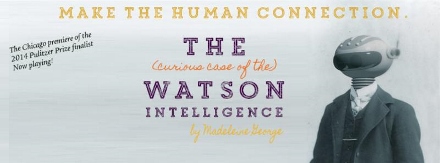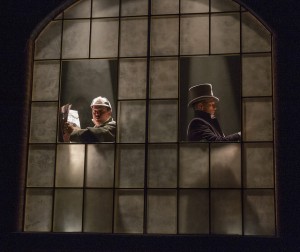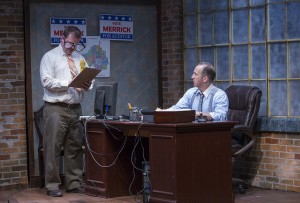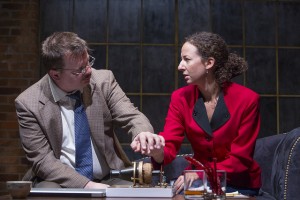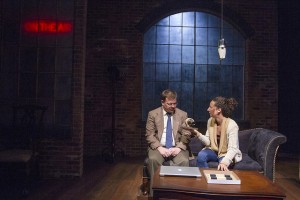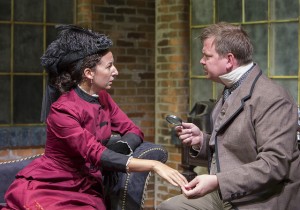I’M FEELING UNLUCKY
The (curious case of the) Watson Intelligence is Theatre Wit’s latest local premiere by Madeleine George, author of Seven Homeless Mammoths Wander New England, a 2014 production that succeeded beyond its script. A wonderment and a puzzlement, George’s creation, rewritten for this production, is an action-based appraisal of how machinery shapes humanity. Maddeningly muddled, the time-traveling, 150-minute plot is loosely anchored in four Watsons, two historical and two literary. Playful but pretentious, indulgent scenes depict the Watsons–and two equally variable characters named Eliza and Merrick–as personifications who explore how our minds and messages are shaped by the processes of communication.
Mind you, this summation is not meant to make this discursive 2014 drama seem a whit more interesting than it is. George’s illustrated lecture doggedly imitates Tom Stoppard’s feasts of ideas and meetings of minds–but its pseudo profundity falls way short of his marvelous mark: Its whole is definitely less than the sum of its parts.
Four turning points are dramatized: the programming victory of IBM’s Watson computer in a 2011 Jeopardy episode; an imaginary 1891 case in which Dr. Watson sleuths without Sherlock Holmes to locate an estranged spouse; an actual 1931 radio interview at Bell Labs in which Thomas A. Watson talks about a final milestone; and that event itself, the famous 1876 vocal communication with Alexander Graham Bell over the telephone, the first successful wire transmission after over 200 attempts.
Out of three actual and one hypothetical happenings, The Watson Intelligence presents scenes suggesting the effects of these breakthroughs. The most developed–and recent–one involves Eliza, a geek computer programmer working for a start-up modestly called Digital Fist. Her laudatory–and ridiculous–goal is to create a communication device that will fight America’s economic inequality by ministering to individuals rather than inspiring social action. Somehow this “heartphone” will make us feel less alone, thus easing our rage over the theft of the nation’s wealth by the predatory 1%. “Hum” as in “bug.”
This Eliza seeks advice from Watson, a Siri-style computer she consults, on her love affair with Watson, the dweebish techie hired by Eliza’s embittered husband Merrick, a reactionary city auditor, to spy on her. This ardent lover works overtime to overcome Eliza’s fear of being known too well and loved too little. A parallel scene, set in Victorian times, shows how little human nature has changed: Another Eliza, drawn to another inventor also fears that someone will “ruin me with love,” the perversely arch line that ends this curiosity.
Not above splitting hairs, dancing on the head of a pin, and depicting distinctions without a difference, the tendentious drama delivers a disquisition on the exquisitely varied nuances of two differing versions of Bell’s famous line: “Watson, I need you” and “Watson, I want to speak to you.” Whatever.
It’s more trouble than it’s worth to force an overarching theme on a self-absorbed and refractory work. Ever enterprising and sporadically engaging, Jeremy Wechsler’s staging showcases three talents far better than George’s smugly eclectic exercise. Joe Dempsey brings sly cynicism to the materialistic Merrick. Joe Foust deftly delivers Watsons who range from hapless cyber-sincerity to aching heartbreak. (His charmingly inept Dr. Watson is the play’s one comic triumph.) Finally, a lyrically conflicted Kristina Valada-Viars grounds her Elizas in a fear of feeling that’s virtually our human coding and very emotionally encrypted.
These dedicated performances notwithstanding, the play does not cohere. It’s the victim of its own overloaded circuitry. Artificial Intelligence indeed.
photos by Charles Osgood
The (curious case of the) Watson Intelligence
Theater Wit, 1229 W. Belmont Ave.
Thurs-Sat at 8; Sun at 7
ends on November 14, 2015
for tickets, call 773.975.8150 or visit TheaterWit.org
for more info on Chicago Theater, visit TheatreinChicago.com
